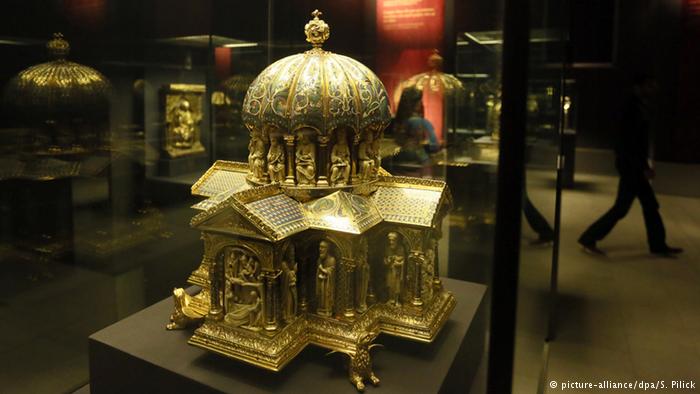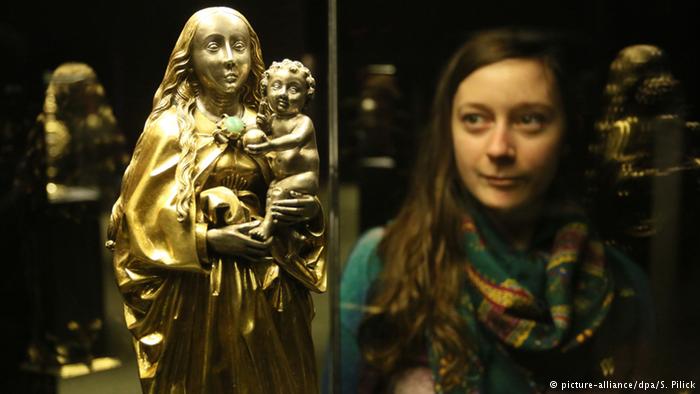News:
'Guelph heirs want recognition from Germany'
By Sarah Hofmann
The heirs to the valuable medieval Guelph Treasure are appalled that Germany hasn't recognized its 1935 sale to the Nazis as unlawful. Their lawyers explain what they're after, and why they've taken their case to the US.

DW: The story of trying to reclaim the Guelph Treasure started in the beginning of 2008 with a letter by you, Markus Stötzel, to the Prussian Cultural Heritage Foundation, claiming that the treasure had been sold under pressure in 1935 and at a price far below the actual value. Last year, the Limbach Commission concluded that the 1935 sale was lawful and the collection should remain in Germany. Why are you taking the case to a court in Washington, D.C. now?
Markus Stötzel: After the full-scale research we started in 2008, we found in the archives more than 200 pages of minutes, memos, and correspondence between Prussia, the Dresdner Bank - which was very much involved as an agent for the state of Prussia at the time - and the art dealers. From these records and further evidence we've found elsewhere, it was pretty much clear that this is what we call a "NS-Vermögensverlust" [Eds: Nazi repossession of property].
There was no question about the fact that our clients are entitled to restitution. [Limbach Commision head] Jutta Limbach issued a non-binding recommendation, and our clients felt that this was unfair. Because of the fact that Germany does not yet provide a real setup for determining the fate of Nazi-looted art - there is a lack of legal framework -, the option left for our clients was to go to court in America, which is the right place and the right forum to have justice served.
But wasn't it your idea to involve the Limbach Commission in the first place? What caused you to dispute the Commission's decision?
Markus Stötzel: I think there is a misunderstanding of the role and function of the Limbach Commission. It is an advisory board which was set up in 2003 in order to mediate in cases like this one. Limbach is not a court; their decisions are non-binding. Jutta Limbach has the role of a mediator and this is why our clients had hoped to achieve some sort of agreement.
Do your clients want the Guelph Treasure back? Or do they want the Prussian Cultural Heritage Foundation or the German government to pay compensation?
Mel Urbach: The number one goal for our clients is recognition. They feel hurt, insulted; to some extent their families' memories have been trampled on by an unfair process. The families of the art dealers were good German citizens who lived in Germany for hundreds of years, who had become part of the German society. They served Germany in World War I; some of them were decorated as brave soldiers.

Two of the three attorneys representing the Guelph heirs: Markus Stötzel (left) and Nicholas O'Donnell
Suddenly, in 1933, everything changed and they were forced into a very difficult situation. They had to flee and realign themselves in a new country. We have not yet been able to provide our clients with any sort of recognition. We want the Prussian Cultural Heritage Foundation and the German government to say: We understand what happened to your clients families' during the early years of Nazi terror.
But suing Germany at a court in Washington, D.C. must be about more than just recognition.
Stötzel: From the complaint, it's pretty clear: The collection has to be returned. And US courts provide the right forum to achieve that. Also, the Prussian Cultural Heritage Foundation went to court in America to get back another artifact which was stolen because of the impact of the war, and they won. Germany has no law regarding restitution - unlike other countries, like Austria - so claimants go to America, and the Prussian Cultural Heritage Foundation does too.
Are there any new documents that you are presenting to the court in Washington, D.C. that you didn't have at the time of the Limbach Commission?
Urbach: We've come across some archive material in the Cleveland Museum of Art. The former director of the museum purchased several pieces in the Guelph Treasure collection in the early 1930s and in his memoirs, he describes the following years. Although he was in the US, he was worried about what would happen to his collection, should the Nazis want it back.
And he also expresses concern for the owners who are in Germany. He travels quite regularly to Germany and describes some details about the lives of these art dealers. He is a witness to what it was like in early years of Nazi terror in Germany. He is not alive anymore, but for events that happened 70 or 80 years ago, we have to go into the archives. And these prove very clearly that these art dealers were victims of Nazi persecution.
But one could say, well, the Prussian state paid a lot of money: 4.25 Million Reichsmark. They didn't steal it.
Urbach: The leading Nazis, including Hermann Göring, didn't want to be seen as thieves or as looters; they wanted to disguise themselves. Perhaps later during the war they didn't care that much anymore, but in the early years of terror the modus operandi was that the sales that took place and the "aryanization" of property were disguised and hidden behind a pseudo-legal framework for propaganda reasons.
To some extent, our clients are concerned that the confusion of Nazi terror and propaganda still have an impact up to 2014 and 2015. It was a Nazi-tainted sale - not only to any Nazi but we're talking about the prime minister of Prussia, Hermann Göring, who was clearly behind the sale of this treasure. The Gestapo came after them and the art dealers' lives were threatened because of the Guelph Treasure. Braking up the collection and selling some of it to the United States had brought them the hatred of the Nazi-regime. To think that these people had any free will in this sale is absolutely preposterous. It is against the truth.
Stötzel: The whole sale was manipulated by the Nazis, which we have clear proof of from the Dresdner Bank records. The price was far below market value. There is no question about it. And the money didn't end up in their pockets. After 1933, the art dealers got into real trouble because people stopped buying from them, so these people were financially stripped. When they got the money, they paid back their debts. In post-war times, the families described the Guelph Treasure as a huge financial loss. They didn't make a profit with that money.
What would you estimate was the actual value of the collection at that time?
Urbach: Our understanding is that the purchase of the collection in 1935 was at a price of 35 percent of the actual value.
Stötzel: At the end of the 1920s, the art dealers obviously got a very good price when they bought the Guelph Treasure from the Duke of Brunswick for 7.5 million Reichsmark. Others appraised it at the time at a price of 24 million Reichsmark. The Nazis at the forefront in the Prussian ministry admitted in their internal minutes, in the memos that they discussed with Hermann Göring, that the collection was still worth at least 6 to 7 million Reichsmark, but said that "we will get it for less, because they are in trouble." Among experts, there is no doubt that the agreed sales price was a mere fraction of the market value at the time.
The Guelph Treasure was recently declared a "cultural good of national importance" in Germany. Don't you think it should remain in Germany?
Urbach: Germany has had this collection ever since the Allies found it. It was returned to Germany in trust until the actual owners could be found. But over the years this part of the story was forgotten. For Germany to nationalize it now, knowing that our clients are out there and dissatisfied, is for me a step backwards from recognition. I think it's a very insensitive step that shouldn't have been taken now. In a couple of weeks, there will be a preliminary hearing by the court where both sides will be represented and it will be interesting to see what the judge has in mind.
Markus Stötzel, Mel Urbach and Nicholas O'Donnell are the attorneys for the heirs - represented by one grandchild and a great-nephew - of the art dealers who sold the Guelph Treasures to the Nazis in 1935.



